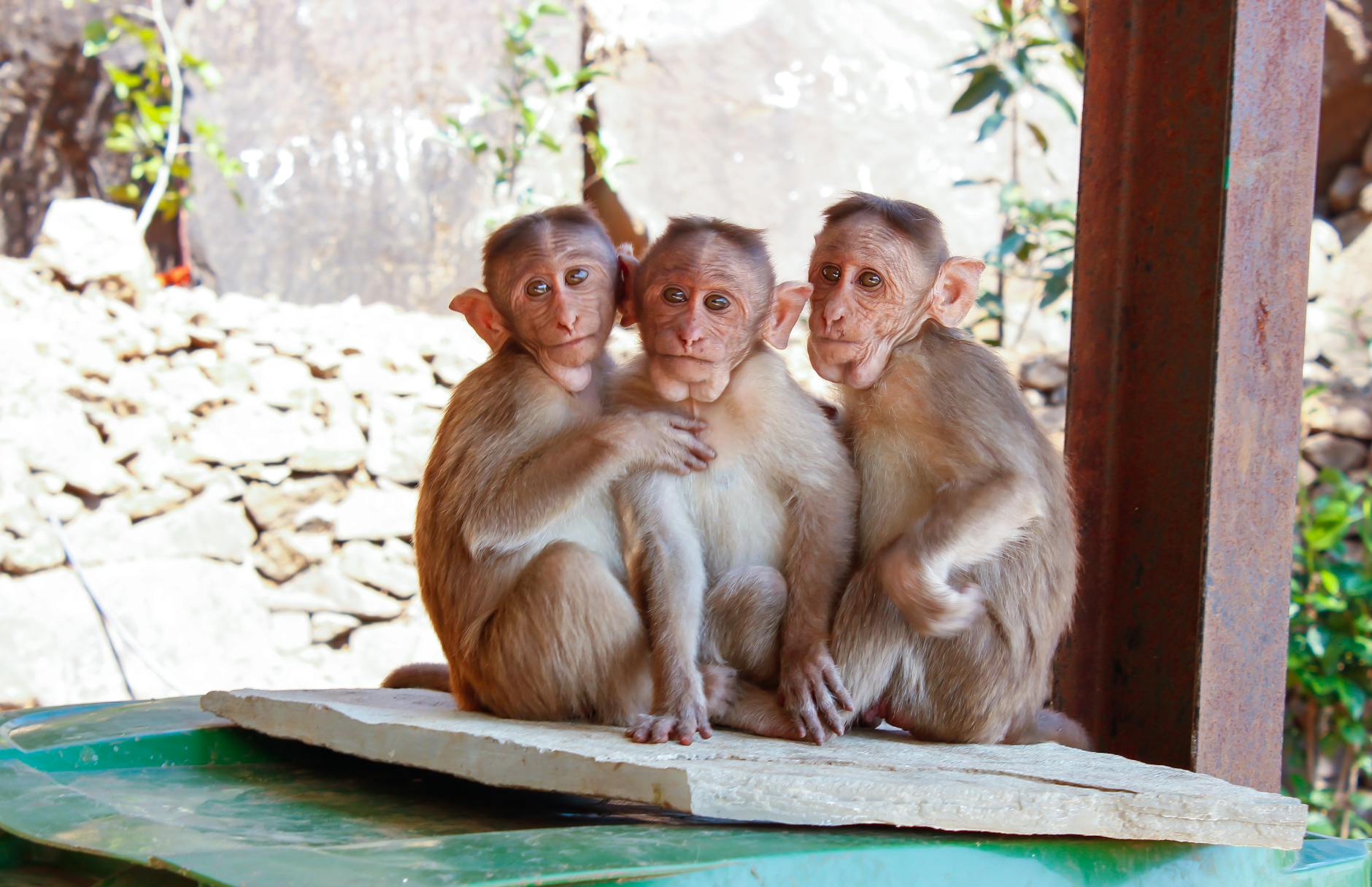Monkeys, those fascinating primates that capture our imagination with their playful antics and remarkable intelligence, have several distinctive collective nouns that add color and precision to our language. These group terms not only describe gatherings of monkeys but also often reflect their behavior, social structure, and characteristics.
Common Collective Nouns for Monkeys
The most widely accepted and frequently used collective nouns for monkeys are:
- Troop: The most common and scientifically accepted term
- Barrel: Often used for playful or mischievous groups
- Cartload: Referring to a large, active group
- Mission: Used for purposeful gatherings
- Tribe: Describing family-oriented groups
Understanding the Term “Troop”
A troop is the most scientifically accurate and commonly used collective noun for monkeys. This term has gained widespread acceptance among primatologists and wildlife experts for several reasons:
- It reflects the organized social structure of monkey groups
- It emphasizes their hierarchical nature
- It indicates their cooperative behavior patterns
Social Structure Within a Troop
Monkey troops typically exhibit a complex social hierarchy with:
| Position | Role | Characteristics |
|---|---|---|
| Alpha Male | Leader | Dominant, protective |
| Senior Females | Matriarchs | Decision makers, caregivers |
| Juveniles | Young members | Playful, learning |
| Subordinate Adults | Support | Cooperative, defensive |
The Origins of “Barrel”
The term barrel of monkeys originated from the popular children’s toy and game, but has since become a legitimate collective noun. It particularly emphasizes the:
- Playful nature of monkey groups
- Their tendency to cluster together
- Their acrobatic abilities
Specialized Collective Nouns and Their Contexts
The “Mission” of Monkeys
The term mission is particularly interesting as it reflects the purposeful behavior often observed in monkey groups. This collective noun is most commonly used when:
- Monkeys are foraging for food
- Groups are migrating
- Coordinated territorial defense occurs
“Cartload” and Group Size
A cartload typically refers to a larger gathering of monkeys, often seen in:
- Urban environments
- Temple complexes
- Wildlife sanctuaries
Species-Specific Collective Nouns
Different monkey species may have distinct collective nouns based on their characteristics:
Baboons
- Congress: Reflecting their democratic decision-making
- Flange: Used specifically for male groupings
- Troop: The standard term for mixed groups
Macaques
- Colony: Often used for temple-dwelling groups
- Gang: Applied to urban-dwelling groups
- Wisdom: Reflecting their problem-solving abilities
Howler Monkeys
- Chorus: Referencing their vocal nature
- Band: Used for their tight-knit groups
- Whoop: Describing their characteristic calls
Cultural and Regional Variations
Different regions have developed their own collective nouns for monkeys:
| Region | Preferred Term | Cultural Context |
|---|---|---|
| South Asia | Blessing | Religious significance |
| Africa | Tribe | Social structure emphasis |
| Americas | Troop | Scientific observation |
| Southeast Asia | Family | Community focus |
Usage Guidelines and Context
Formal vs. Informal Usage
The choice of collective noun often depends on the context:
Formal Contexts
- Scientific papers: “troop” is standard
- Wildlife documentation: “group” or “colony“
- Academic writing: “population” for larger numbers
Informal Contexts
- Creative writing: “barrel” or “cartload“
- Children’s literature: “family” or “party“
- Journalistic writing: “band” or “gang“
Grammar and Usage Rules
Article Usage
When using collective nouns for monkeys, proper article usage is crucial:
- Use “a” before consonant sounds: “a troop of monkeys”
- Use “an” before vowel sounds: “an assembly of monkeys”
Verb Agreement
Collective nouns can take either singular or plural verbs:
| Structure | Example | Context |
|---|---|---|
| Singular | The troop is moving | Acting as one unit |
| Plural | The troop are fighting | Individual actions |
Common Mistakes to Avoid
Incorrect Usage
- Mixing metaphors: “A flock of monkeys” (incorrect)
- Using bird-specific terms: “A murder of monkeys” (incorrect)
- Creating random combinations: “A bunch of monkeys” (informal)
Proper Usage
- “A troop of monkeys swings through the trees”
- “The mission of monkeys searches for food”
- “A barrel of monkeys plays in the sanctuary”
Behavioral Context
The choice of collective noun often reflects specific behaviors:
Active Behaviors
- Foraging: “mission” or “troop”
- Playing: “barrel” or “cartload”
- Traveling: “caravan” or “tribe”
Social Behaviors
- Grooming: “congress” or “gathering”
- Resting: “company” or “party”
- Protecting: “guard” or “troop”
Example Sentences with Collective Nouns
- “The troop of rhesus macaques skillfully navigated through the temple complex.”
- “A barrel of young monkeys was playfully swinging from vine to vine.”
- “The mission of capuchin monkeys systematically searched the forest floor for food.”
- “A congress of baboons carefully deliberated their next move at the waterhole.”
- “The tribe of howler monkeys announced their presence with loud calls.”
- “A cartload of spider monkeys gracefully moved through the canopy.”
- “The wisdom of macaques demonstrated remarkable problem-solving abilities.”
- “A blessing of langurs peacefully occupied the ancient temple grounds.”
- “The colony of proboscis monkeys established their territory near the river.”
- “A band of squirrel monkeys expertly foraged in the rainforest.”
- “The gathering of golden snub-nosed monkeys huddled together for warmth.”
- “A party of vervet monkeys cautiously approached the water source.”
- “The gang of urban macaques strategically planned their market raid.”
- “A company of gibbons melodiously sang their morning songs.”
- “The guard of mandrills vigilantly protected their young ones.”
- “A chorus of howler monkeys echoed through the jungle at dawn.”
- “The assembly of colobus monkeys gracefully leaped between branches.”
- “A caravan of baboons methodically crossed the savannah.”
- “The flange of orangutans carefully constructed their nests.”
- “A family of bonobos peacefully shared their evening meal.”
Key Takeaways
Understanding collective nouns for monkeys enriches our language and provides precise ways to describe these fascinating primates in various contexts. Whether in scientific documentation or creative writing, choosing the appropriate collective noun enhances communication and reflects the specific behaviors and characteristics of these remarkable animals.
